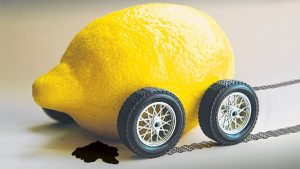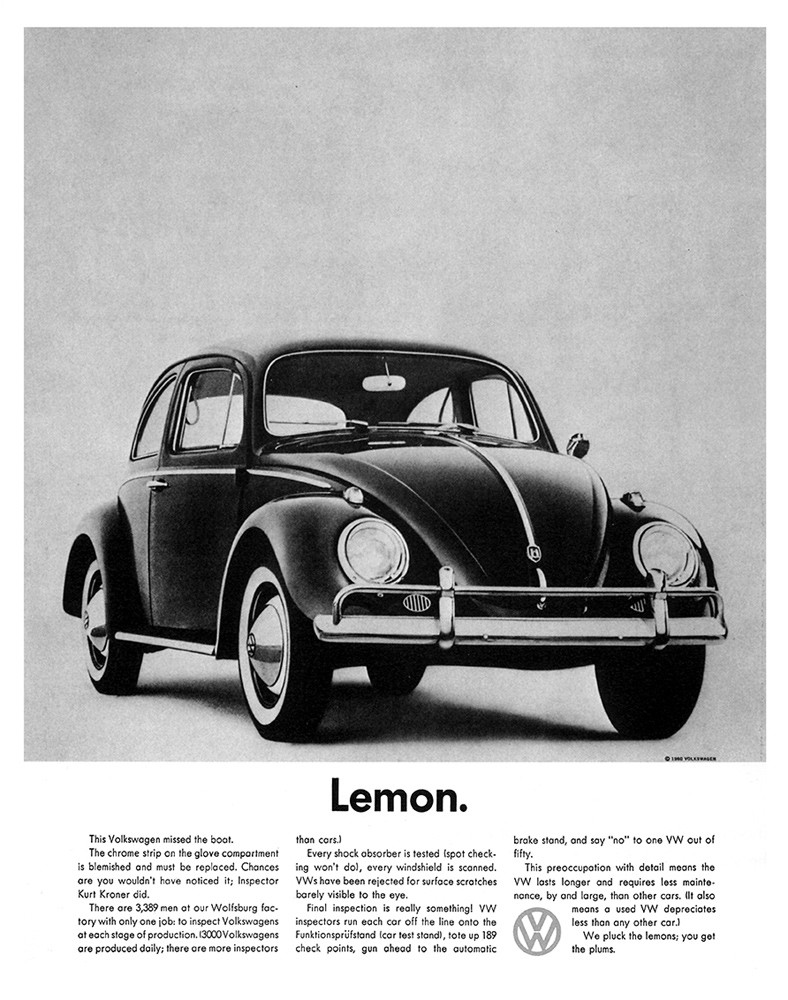Why Cars Are Called Lemons & How You Can Avoid Buying One
 March is Fraud Prevention Month, and to honour its importance, we’ve decided to discuss a very important topic – lemons. We’re not talking about picking fruit here. As many of you already know, the word “lemon” refers to defective cars deliberately sold by shady dealers. And all drivers, including yourself, can get duped if you’re not careful. That means you need to know the signs of a potential lemon car, so that you spare yourself the costs, hassles and embarrassment of owning one. It takes a little detective work to uncover a car’s flaws, but it’s an effort that can prevent drivers from heartbreak.
March is Fraud Prevention Month, and to honour its importance, we’ve decided to discuss a very important topic – lemons. We’re not talking about picking fruit here. As many of you already know, the word “lemon” refers to defective cars deliberately sold by shady dealers. And all drivers, including yourself, can get duped if you’re not careful. That means you need to know the signs of a potential lemon car, so that you spare yourself the costs, hassles and embarrassment of owning one. It takes a little detective work to uncover a car’s flaws, but it’s an effort that can prevent drivers from heartbreak.
Why a Lemon?
Of all the fruits the Earth produces, why do we use lemons to describe damaged cars? Why couldn’t we have called them apples, or a banana (which actually has comedic appeal)? It has to do with expectations. Lemons look appetizing when you see them, but when you cut them open and taste them, they’re quite sour. That’s why the lemon serves as a perfect metaphor for cars that disappoint their drivers – their exterior hides some serious flaws on the inside.
When Did Lemons Become Automobiles
 Although the word has been used as an insult since the 1800s, we started calling faulty cars “lemons” at the beginning of the 20th century. It seems to have officially turned to an automotive term in a 1931 article in the U.K. newspaper, The Morning Post. However, the usage of the term really picked up in the 1970s, when the Volkswagen ad created by Julian Koenig and Helmut Krone – a copywriter/art director team at the ad agency DDB – hit the media. It was a part of VW’s Think Small campaign, which catapulted the German brand into the American consciousness as a high-end and trendy vehicle.
Although the word has been used as an insult since the 1800s, we started calling faulty cars “lemons” at the beginning of the 20th century. It seems to have officially turned to an automotive term in a 1931 article in the U.K. newspaper, The Morning Post. However, the usage of the term really picked up in the 1970s, when the Volkswagen ad created by Julian Koenig and Helmut Krone – a copywriter/art director team at the ad agency DDB – hit the media. It was a part of VW’s Think Small campaign, which catapulted the German brand into the American consciousness as a high-end and trendy vehicle.
What Does a Lemon Car Look Like?
As mentioned in the previous paragraph, a lemon car betrays expectations. These cars tend to look “normal” from an appearance standpoint, devoid of dents, scratches and rust. They’re unsuspecting. But if a mechanic was to look under the hood, they could find a series of hidden defects. Or if a buyer did just a bit of driving, the problems would start to reveal themselves in the upcoming weeks and months. Typically, these cars are new. Generally, these problems show up just weeks after the purchase. It is then that the owner realizes they bought a piece of junk. In an article published in Consumer Reports, you can find a list of potential warning signs that indicate whether a car is a lemon or not.
The flavour of a lemon car
- Damaged tires – Damaged tire treads alone aren’t good indicators of a car’s condition, but in some cases, they may serve as red flags. If the tires have a “cupped” appearance, it is likely that the car has issues with its steering, suspension and brakes.
- “Clunking” when steering – The feedback you get from a car while steering is a tell-tale sign of a car’s “health”. If it makes a clanking noise while turning left or right, there could be link damage or a worn-out gear. Additionally, if the wheel shakes or the car veers from a straight path, then there’s a good chance the vehicle has steering defects.
- Exterior & interior damage – Earlier, we said that a lemon car may look okay – that is, upon first glance. Taking a deeper look, however, might reveal chipped paint, mismatched body panels and interior flaws, including a crack in the dashboard and missing buttons.
- Worn-out suspension – A damaged suspension shows in various ways; common signs are hard rebounds after pushing on the fender, and heavy bouncing while moving at a normal or even slow speed.
- Tailpipe spews fumes – If the tailpipe of the car starts spewing out anything but the usual fumes, then something’s up (excuse the pun). Billowing white smoke could be an indirect sign of a blown gasket or a damaged cylinder head, while blue smoke indicates burning oil. All of these issues are expensive to fix.
- Engine revs with light acceleration – The sound of an engine revving can be quite pleasing to the ear. But if a light tap of the gas revs the engine too much, then that could be a sign of trouble. Generally, it stems from a clutch that’s unadjusted, worn-out, or from a damaged automatic transmission. A clutch that needs readjusting isn’t too expensive, but if it’s completely worn-out, then the driver will have to cough up some serious dollars. The same goes for an automatic transmission that’s damaged.
Spotting a Lemon
Although there could be a number of lemons sitting in car lots near you, there are still ways to identify the signs of a lemon with a bit of work. Even if you don’t have much automotive knowledge, there are some simple tricks to prevent you from driving a decrepit car.
Work with a dealer that does the following…
- Reviews vehicle history – The more you know about the car’s past, the more you’ll know about it’s current state
 and future. A trustworthy dealership whether they’re new or used, will review a car’s history to ensure that it’s in good condition for the road. They won’t even keep a car in their inventory if they discover that it has serious defects in the first place.
and future. A trustworthy dealership whether they’re new or used, will review a car’s history to ensure that it’s in good condition for the road. They won’t even keep a car in their inventory if they discover that it has serious defects in the first place.
- Mechanical inspection – For an added sense of security, a reputable seller will physically test their cars to get a feel for how it drives, taking note of any peculiar sounds or motions. Until they are completely sure the car meets the highest standards, they won’t put it out on the road.
- Displays their credentials – Lastly, make sure to check a company’s credentials. Here in Ontario, all credible dealers should have a Used Car Dealer Association (UCDA) certificate. Make sure to check out their testimonials and customer reviews as well since they are a good indicator of a car dealer’s trustworthiness. People are very honest online.
There’s Little Life to Squeeze from a Lemon Car
Don’t ever make the mistake of thinking a lemon car is a fixable item. The money you’ll end up spending to repair would be better spent on a new vehicle altogether. There are countless stories of people who have lost their money and their minds on a car that was too damaged to be driven. Spare yourself such trouble. Learn how to inspect a car and the processes required to ensure it’s safe for use. Even more importantly, learn the traits of a reputable dealer. By making the effort, you will give yourself and your family the guarantee of driving the best vehicle possible.






